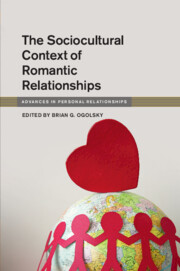Book contents
- The Sociocultural Context of Romantic Relationships
- Advances in Personal Relationships
- The Sociocultural Context of Romantic Relationships
- Copyright page
- Contents
- Contributors
- 1 The Sociocultural Context of Romantic Relationships
- 2 Systemic Racism and Romantic Relationships
- 3 Sociocultural Perspectives on Romantic Relationships
- 4 Gender and Heteronormativity in Romantic Relationships
- 5 Social Class, Neighborhoods, and Romantic Relationships
- 6 Religion and Spirituality in Romantic Relationships
- 7 The Importance of Work in Romantic Relationships
- 8 History and Cohort Effects in Romantic Relationships
- 9 The Legal Meaning of Sex (and Romantic Relationships)
- 10 Romantic Relationships and Traditional Media
- 11 Romantic Relationships and Social Media
- 12 Situating Latinx Immigrant Romantic Relationships in the Context of Illegality
- 13 Romantic Relationships during a Global Pandemic
- Index
- References
9 - The Legal Meaning of Sex (and Romantic Relationships)
Published online by Cambridge University Press: 19 October 2023
- The Sociocultural Context of Romantic Relationships
- Advances in Personal Relationships
- The Sociocultural Context of Romantic Relationships
- Copyright page
- Contents
- Contributors
- 1 The Sociocultural Context of Romantic Relationships
- 2 Systemic Racism and Romantic Relationships
- 3 Sociocultural Perspectives on Romantic Relationships
- 4 Gender and Heteronormativity in Romantic Relationships
- 5 Social Class, Neighborhoods, and Romantic Relationships
- 6 Religion and Spirituality in Romantic Relationships
- 7 The Importance of Work in Romantic Relationships
- 8 History and Cohort Effects in Romantic Relationships
- 9 The Legal Meaning of Sex (and Romantic Relationships)
- 10 Romantic Relationships and Traditional Media
- 11 Romantic Relationships and Social Media
- 12 Situating Latinx Immigrant Romantic Relationships in the Context of Illegality
- 13 Romantic Relationships during a Global Pandemic
- Index
- References
Summary
Between the no-fault divorce revolution and various court rulings classifying sexual behavior between two adults as a private, intimate matter, some scholars have noted a shift away from traditional morality around sex in conjugal, cohabiting, and dating relationships in family law. The act of sex in a romantic relationship is often perceived as one’s complete liberty without bounds. Many underrate the legal consequences attached to their sexual behavior. However, sex is still the defining consideration that creates legal recognition of a romantic relationship between two people. It creates legal duties to each other and any minor involved in the partnership, irrespective of biological ties, in a relational parentage era. Past and recent court rulings, including rulings from nonmarital, intimate partner violence, and parentage cases, are provided as examples to recount the legal meaning of the act of sex.
- Type
- Chapter
- Information
- The Sociocultural Context of Romantic Relationships , pp. 151 - 167Publisher: Cambridge University PressPrint publication year: 2023

